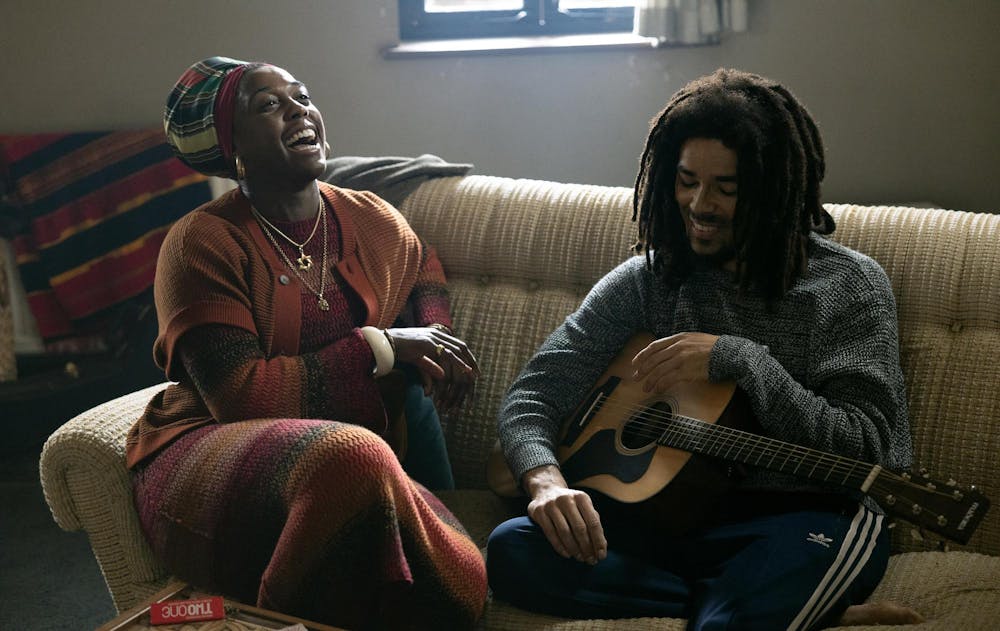As the weather outside slowly warms, so does the movie industry from the icy clutches of the typical subpar January movie slate. While it’s scheduled to be released in theaters Feb. 14, the Indiana University Union Board hosted an early screening of the music biopic, “Bob Marley: One Love” on Tuesday.
The movie follows Marley from 1976 and on, as the Jamaican reggae star deals with political unrest and an assassination attempt in his beloved home country. Starring Kingsley Ben-Adir as Marley, Lashana Lynch as Rita Marley and James Norton as Chris Blackwell, the movie intercuts between scenes of Marley’s youth and his time in London after leaving Jamaica, where he recorded his album “Exodus.”
Whether you’ve heard of Bob Marley from an enthusiastic relative or more importantly, his image as a global symbol for peace, love, democratic reforms and the Rastafari spirit, his impact across music and culture can still be felt over 40 years since his passing. In the recent Hollywood spew of music icon biopics like "Elvis,” “Tick Tick Boom” and "Maestro,” “Bob Marley: One Love,” won’t rock any waters, but I enjoyed the whole film while watching.
The Jamaican shores, warm sunsets and colorful views are enough to take the viewer on a pleasing journey for the eye. The movie showcases Bob Marley and the Wailer’s infectious, relaxing beats right off the bat, and continues to employ them extremely well throughout the movie. Director, Reinaldo Marcus Green knows the audience and finds any time he can to use the music in scenes of Marley and the Wailers jogging on the beach or playing soccer in the town. I admit it was hard to not hum and tap my feet along. It tells the story faithfully, and you come out of the theater feeling like you learned what’s important to know about the icon’s life.
What holds the movie back is the short-ish runtime. At 1 hour and 47 minutes, I was happy for the easier watch, but the runtime proves to be a double-edged sword by holding it back from any real deep emotional build for those not too familiar with Marley’s life. The acting is good across the board; Kingsley Ben-Adir's effort and dedication to the role really pays off. Learning that the film had the approval and guidance of Marley’s family makes one appreciate the thought and care put in even more.
Lashana Lynch gives the most emotionally powerful performance of the movie, but it’s held back by the film's inability to build or provide depth to the real problems of the film. The conflict between Bob and Rita about his handling of his newfound fame had some good moments and conversations but it’s ultimately resolved in 15 minutes after two scenes. Few of the conflicts of the movie built the palpable emotional tension that they deserve, and I wish they hit harder while watching.
The choice to mainly focus on his life from the period of Jamaican political unrest to his time in London was a good one, allowing the movie to focus on the most conflict-riddled and influential part of his life, along with the writing of his best-selling album, “Exodus,” which was named the best album of the 20th century by Time Magazine in 1999.
However, it left me wanting more from the period being explored. The ending is where I felt the strongest desire to see more. The movie builds up the emotional anticipation of one more iconic song being played at the final peace concert, but then fades into a textual explanation of what happened after, leaving you with the desire for just one more of his hits humming through the speakers. While it’s beyond cliche to end a music biopic with a grand concert, I genuinely wanted one for this.
Maybe this lack of emotional poignancy for me comes from my level of fandom and lack of experience that I have with the artist. I didn’t grow up in the 70s, watching Marley’s stardom and influence rise and flourish; — I can’t resonate and connect with the importance of Marcus Garvey and Haile Selassie to the Rastafari movement of the time. My experience comes only from personal searching on Spotify and the influence of an uncle.
A stronger connection with the music and the time may have indeed given me the emotional potency I wanted to feel while watching, but all I can do is hope older viewers feel that way and feel that the movie did the story justice.
“Bob Marley: One Love” accomplished the goals of the limited genre of music biopics, telling the true story of a global icon. For loyal fans of Marley and those who appreciated the movement as it unfolded, the movie will be an enjoyable callback to a particularly interesting time and an even more interesting figure in music history and world culture. For those hoping for a fleshed out, deep examination of Marley as a person throughout his life, this doesn’t do that — but that’s ok!
After all it’s not a documentary which the 2012 “Marley,” will do justice for. Regardless, “Bob Marley: One Love” was an interesting enough, entertaining time on the screen. So, enjoy the music and colorful personalities of Marley and the Rastafari Jamaican spirit he championed.






